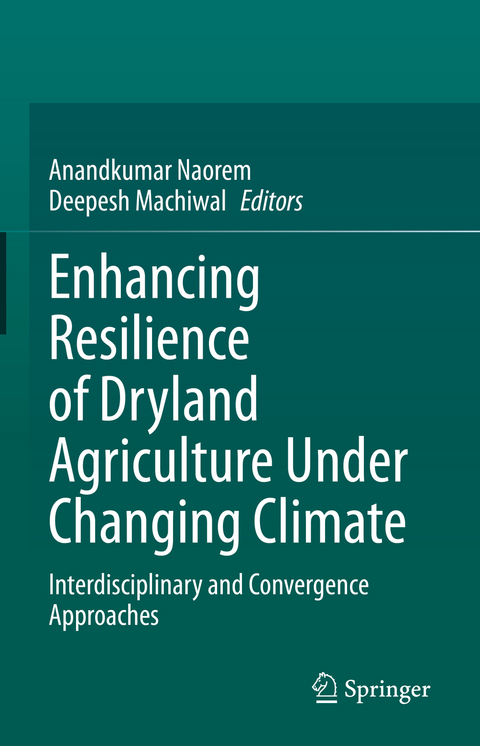
Enhancing Resilience of Dryland Agriculture Under Changing Climate
Springer Verlag, Singapore
978-981-19-9158-5 (ISBN)
Dr. Anandkumar Naorem, is working as a scientist in ICAR-Central Arid Zone Research Institute, Jodhpur, India. He was the former Head-in-charge in ICAR-CAZRI, RRS-Bhuj, India. He received his bachelor's degree from Assam Agricultural University, Assam, India, and his master's degree in soil microbiology and bioformulation from the College of Post-Graduate Studies, Central Agricultural University, Meghalaya, India. His doctoral dissertation at Bidhan Chandra Krishi Viswavidyalaya, West Bengal, India, focused on soil heavy metal remediation for safe cultivation of crops. He has published more than 25 national and international articles that have been peer-reviewed, and has been awarded the best oral and poster presentations at numerous international seminars, workshops, and conferences. He received multiple national honours, including the 2015 Best Zonal Master's Thesis from the Indian Society of Soil Science. In addition, he has been awarded the UGC-Maulana Azad National Fellowship for Minority Students (India). He has been a frequent guest on science and technology-related All India Radio programmes. He has been leading several institution research projects focusing on soil quality in arid areas and is the principal investigator of an international effort to promote spineless cactus as dryland feed in arid regions of Gujarat. Dr. Deepesh Machiwal is Principal Scientist (Soil & Water Conservation Engineering) at ICAR-Central Arid Zone Research Institute, Jodhpur, India. He obtained Ph.D. from Indian Institute of Technology, Kharagpur, India. Deepesh served as Assistant Professor (2005-2011) at College of Technology and Engineering, Udaipur, India. He worked as co-principal investigator in three research projects externally-funded by ICARDA, ICAR and state government. Deepesh has 59 papers in peer-reviewed journals, 4 books, 19 book-chapters, and 33 papers in conference-proceedings. His book was awarded by Outstanding Book Award-2012-13. He was conferred with Commendation Medal Award-2019, Best Paper Award-2018, Achiever Award-2015, Distinguished Service Award-2012-13, and IEI-Young Engineer Award-2012. He was awarded Junior Research Professional Fellowship and Second-Best Comprehensive Group Paper Award-2007 by IWMI, Sri Lanka. He was sponsored by FAO-Rome and UN-Water for participating in workshops at China and Indonesia.
1. Drylands: An Introduction.- 2. Current state and prediction of future global climate change and variability in terms of CO2 levels and temperature.- 3. Vulnerability of dryland agriculture over non-dryland agriculture toward the changing climate.- 4. Climate risk management in dryland agriculture: Technological management and institutional options to adaptation.- 5. Achieving land degradation neutrality to combat the impacts of climate change.- 6. Establishing linkages among changes in land-use, vegetation and crop lands to arrest soil erosion and desertification.- 7. Management of salt-affected soils for increasing crop productivity.- 8. Role of water harvesting and supplemental irrigation in enhancing agriculture productivity of dryland under climate change.- 9. Assessment and management of soil and water erosion in dryland ecosystem.- 10. Advances in micro-irrigation practices for improving water use efficiency in dryland agriculture.- 11. Enhancing agricultural water productivity using deficit irrigation practices in water Scarce regions.- 12. Meta-analysis studies emphasizing activities related to natural resources management for imparting resilience to dryland agriculture.- 13. Soil organic carbon sequestration in dryland soils to alleviate impacts of climate change.- 14. Soil Inorganic Carbon in drylands: An unsung player in climate change mitigation.- 15. Remediation of polluted soils for managing toxicity stress in crops of dryland ecosystems.- 16. Fertilizer management in dryland cultivation for getting stable crop yields.- 17. Development of a successful integrated farming system model for livelihood sustenance of dry land farmers.- 18. Unlocking potential of dryland horticulture in climate-resilient farming.- 19. Genetically-modified crops and crop species adapted to global warming in dry regions.- 20. Weed Management in Dryland Agriculture.- 21. Insect and Pest Management for sustaining crop production under changing climatic patterns of drylands.- 22. Potential effects of future climate changes in pest scenario.- 23. Impact of climate change on plant viral diseases.- 24. Adaptation Strategies for Protected Cultivation under Changing Climate Patterns in Dry Regions.- 25. Organic farming: prospects and challenges in drylands.- 26. Biochemical and Molecular aspects for plant improvement under climate stress.- 27. Understanding linkages between livestock sensitivity and climate variability in drylands for developing appropriate management strategies.- 28. Grass-legume intercropping for enhancing quality fodder production in drylands.- 29. Economic analysis of sustainable dryland agriculture practices.- 30. Adoption of Sustainable Dryland Technologies for Improving Livelihood of Farmers in Developing Countries.- 31. Challenges and Prospects in managing dry land agriculture under climate change scenario.- 32. Adaptive Resilience: Sustaining Dryland Agriculture the pastoralist way.- 33. Resource Conserving Mechanization Technologies for Dryland Agriculture.- 34. Agricultural mechanization for efficient utilization of input resources to improve crop production in arid region.
| Erscheinungsdatum | 14.03.2023 |
|---|---|
| Zusatzinfo | 51 Illustrations, color; 4 Illustrations, black and white; XXI, 716 p. 55 illus., 51 illus. in color. |
| Verlagsort | Singapore |
| Sprache | englisch |
| Maße | 155 x 235 mm |
| Themenwelt | Naturwissenschaften ► Biologie ► Ökologie / Naturschutz |
| Weitere Fachgebiete ► Land- / Forstwirtschaft / Fischerei | |
| Schlagworte | arid and semi-arid regions • climate change • Global Drylands • Interdisciplinary and convergence approaches • management practices • sustainable agriculture |
| ISBN-10 | 981-19-9158-8 / 9811991588 |
| ISBN-13 | 978-981-19-9158-5 / 9789811991585 |
| Zustand | Neuware |
| Haben Sie eine Frage zum Produkt? |
aus dem Bereich


